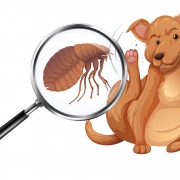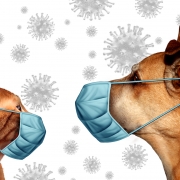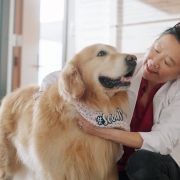Kennel Cough (CIRD): What is it?
BY KERRI WIEDMEYER, DVM, WVRC
Kennel cough is characterized by an infection of typically more than one of the following infectious agents: Bordetella bronchiseptica, canine adenovirus type 2, canine distemper virus, canine herpesvirus, canine influenza, canine parainfluenza, canine pneumovirus, canine reovirus, canine respiratory coronavirus, Mycoplasma spp, and Streptococcus spp.
Kennel cough causes a persistent hacking cough that is typically self-limiting in mild cases and may not require any treatment. These infectious agents can be transmitted through the air, direct contact with an infected dog and through fomites. Thus when dogs are in a crowded or enclosed area such as kennels, boarding facilities and dog parks, these infectious agents have an opportunity to spread like wild fire.
Clinical signs:
Dogs can have a variety of signs associated with kennel cough, but the most common is a dry, hacking cough. It is not uncommon for dogs to hack and have a terminal retch with the aggressive coughing that can occur. Dogs with kennel cough may have bouts of coughing when excited and pulling on their leash. Some of the infectious agents causing kennel cough can lead to pneumonia, fever, lethargy and nasal discharge/congestion. These clinical signs are more commonly found in dogs that are either very young, very old or immunocompromised.
Diagnosis:
Kennel cough is often diagnosed based on physical exam findings and the dog’s recent history. A veterinarian will often palpate the trachea, which can elicit a coughing fit in dogs with kennel cough. Recent history of being boarded or at the dog park can help tie together a presumptive diagnosis. Thoracic radiographs should be normal unless pneumonia is present. PCR testing or amplification of pathogen DNA, can be done for a number of the infectious agents listed above. This type of testing is typically reserved for severe cases that are not self-limiting or responding to treatment.
Treatment:
In the majority of cases, kennel cough is self limiting, and no treatment is required. Dogs will often have a cough for 1-2 weeks. Cough suppressants can be prescribed if a dog is unable to get comfortable or sleep due to the bouts of coughing. Cough suppressants should be avoided if a dog has pneumonia. It is not uncommon for antibiotics to be prescribed if a bacterial infection is thought to be part of the cause. Dogs that progress to pneumonia may require hospitalization, intravenous fluids, injectable antibiotics and oxygen supplementation.
Prevention:
Preventing the spread of kennel cough can be challenging as there are many infectious agents that cause it. There are vaccines available for a number of the infectious agents that can help decrease spread. Bordetella bronchiseptica has a vaccine available in both injectable and intranasal forms. This vaccine has to be given every year. For canine parainfluenza virus, canine influenza virus, canine distemper and canine adenovirus type 2, there is a vaccine series that puppies receive and then subsequent boosters. Environmental changes or precautions should be considered as well. Dogs going to dog parks or boarding should be fully vaccinated. Stressful situations, smoke and poor ventilation can also play into the spread and severity of kennel cough.
Overall, the prognosis for dogs that get kennel cough can be very good. That being said, it can be pretty annoying when both you and your poor dog cannot get any sleep because of the loud coughing.












